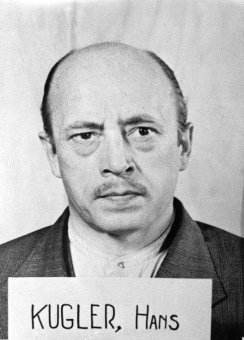Hans Kugler (1900–1968)

© National Archives, Washington, DC
Hans Kugler was born in Frankfurt am Main on December 4, 1900. After finishing school and a commercial apprenticeship, he studied in Frankfurt and graduated in 1921 with a business degree. The same year, he accepted employment in the sales department of Farbwerke Hoechst (formerly Meister Lucius & Brüning), and after only a few months he was made head of the dye department. In 1923, after taking a three-month leave of absence from Hoechst, he received his doctoral degree. He was named an authorized signatory at Hoechst in 1924; in 1928, he received this title at I.G. Farben as well. He married Anna Stickler in 1925, and the couple had two children. With his second wife, Ellinor Antz, he had one child.
In 1929, Hans Kugler was a cofounder of the Tripartite Cartel (Drei-Sparten-Farbstoff-Kartell), and he functioned on its committee of experts as the representative of I.G. Farben. In 1934, he was named director of the Sales Group Dyestuffs at I.G. Farben, but without being made a member of the managing board. In October 1938, by order of the Reich Economic Ministry, Hans Kugler took over as acting manager of the Aussig-Falkenau plants of the Association for Chemical and Metallurgical Production in Prague. In March 1939, he was able to transfer its coal-tar dyes department to I.G. Farben and was named chief executive officer of Teerfarbenwerke Aussig/Falkenau GmbH. In October of the same year, he joined the NSDAP. In addition, he became a member of the Southeast Committee and, one year later, of the Commercial Committee of I.G. Farben. Kugler continued to be active in the appropriation of factories in the occupied regions by the I.G., and in this connection he was made a member of the Commercial Committee of Francolor S.A. in late 1941. In 1943, he became deputy chief of Technical Unit 16 of the Economic Group Chemistry (Wirtschaftsgruppe Chemie); it supervised the production and distribution of dyes and intermediate products until the war ended. In 1944, he also became a member of the advisory panel for export matters of the Chemistry Review Office.
After his arrest by the U.S. military government, Hans Kugler was sentenced in 1948, in the I.G. Farben Trial at Nuremberg, to 18 months in prison for “plunder and spoliation,” specifically for taking over firms in France.
(SP; transl. KL)
















